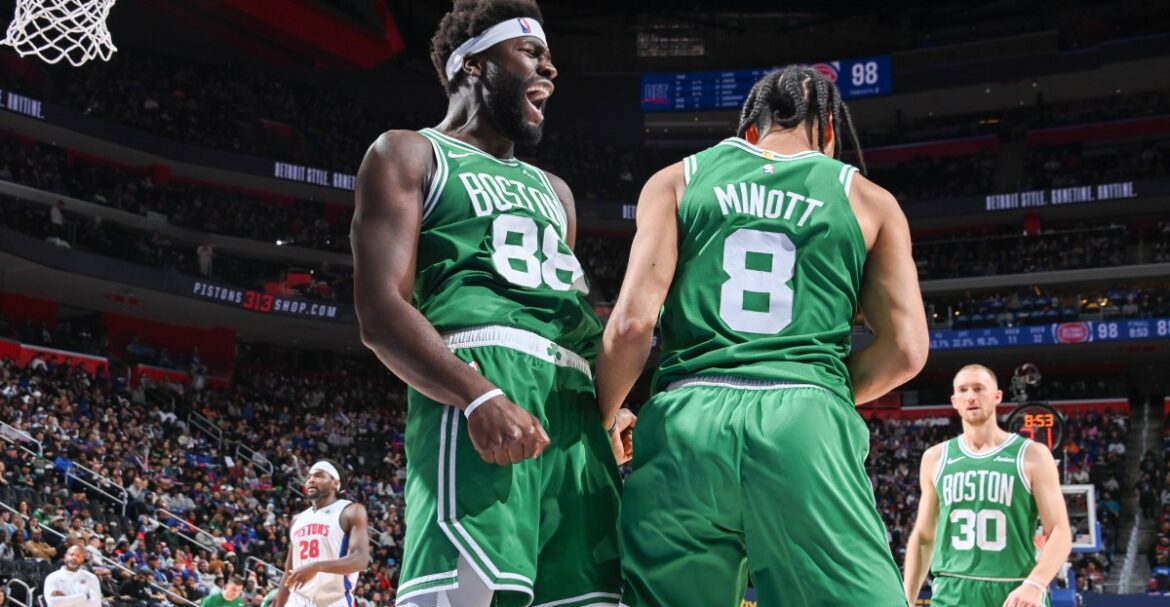BOSTON — For a moment, it looked like the Boston Celtics’ season would be totally inhibited by rebounding.
Standing at his locker in Detroit in late October, Jaylen Brown shook his head when discussing the team’s mounting rebounding woes. In their previous two games — both losses — they were outrebounded by a combined 33 rebounds.
[In their first road game of the season, a 10-point loss to the New York Knicks, the Celtics were outrebounded by 16. Two days later, they were outrebounded by the Detroit Pistons by 17.]
“A lot of our issues, we could solve just on the defensive glass,” said Jaylen Brown after that loss, which dropped the team to 0-3 on the year. “I got to get more involved. I got to get some more rebounds.”
That was three weeks ago.
Now, the Celtics are 8-7, with a winning record for the first time this season. They’ve won 3 straight games and 8 of their last 12, and spirits are much higher than they were in that Detroit locker room.
A lot has improved since October 26th: Payton Pritchard is finding an offensive groove. The young guys — Jordan Walsh, Josh Minott — have demonstrated they can positively impact winning. Brown continues to score the ball at a torrid pace And, Neemias Queta is finding his footing as the team’s starting center.
Perhaps most underrated is the reality that the Celtics are a middle-of-the-pack rebounding team. They rank 12th in the NBA in rebounds per game, averaging 45 rebounds a night. They grab the 8th-most offensive rebounds (13.5 boards per game) and 20th-most defensive rebounds (31.5).
“We got a long way to go,” said Derrick White. “But, beginning of the year, it seemed like we had a longer way to go than we do now.”
Queta, the Celtics’ leading rebounder with 8.5 boards a night, said that after a tough start to the season on the glass, players took ownership of their own individual mistakes and committed to improving on the glass.
“We watched a lot of film on where we can get better,” Queta said. “At a lot of times, rebounding is all about effort — hitting first, making sure your guy doesn’t get it, go get it with two hands.”
What the film showed is that it wasn’t one player who was responsible for the Celtics’ struggles — if every player in the rotation missed a boxout once or twice a night, that added up. It wasn’t necessarily that players weren’t trying; it’s that the margin of error was slim.
“You lose one or two possessions of each game, individually, and then somebody else loses one too, and then you add up, and it makes a big difference,” Queta said. “So, everybody looked in the mirror and just thought about making themselves better. And collectively, we’re all on the same page for that.”
Individual players have demonstrated progress. In his last 6 games, Jaylen Brown is averaging 5.7 rebounds per game. That came after he averaged 4.4 boards in the first 9, and routinely stressed that he needed to be better on the glass.
Jordan Walsh, Josh Minott have been impactful rebounders
Another part of the improvement on the glass seems potentially correlated with the emergence of two young, athletic forwards: Jordan Walsh or Josh Minott.
The 21-year-old Walsh has started the last three games for the Celtics, and has grabbed 16.8% of available rebounds when he’s been on the floor (the second-best mark on the team among players who have played more than 80 minutes this season). Minott, who started the previous 9 games for Boston, has grabbed 14.7% of boards during his time on the court, the third-best mark on the team.
After Queta, who leads the team with an 18.6 defensive rebounding percentage, those two guys have been two of the team’s most consistent rebounders, and Mazzulla has increasingly relied on both as the year has progressed.
The rebounding problems aren’t fixed. Joe Mazzulla would tell you that nothing is ever fixed and that rebounding is something that the Celtics will need to emphasize and commit to every single game.
And, the numbers demonstrate that rebounding is far from a strength. Celtics still have the fourth-worst defensive rebounding percentage in the NBA — they’re grabbing just 56.2% of available defensive rebounds (the Denver Nuggets, in contrast, lead the league with a 65.2% defensive rebounding percentage). And notably, two of their seven losses came as a result of failing to end a defensive possession with a rebound (Jusuf Nurkic scored the game-winner for the Utah Jazz over Neemias Queta after the Celtics’ center didn’t box him out, Kelly Oubre did the same a few weeks later for the Philadelphia 76ers over Jaylen Brown).
But, for a moment there, it seemed like no matter how good the Celtics’ defense was — and it’s been strong since Day 1 — rebounding would be the bane of the team’s existence.
It’s still early, but that no longer appears to be the case.
